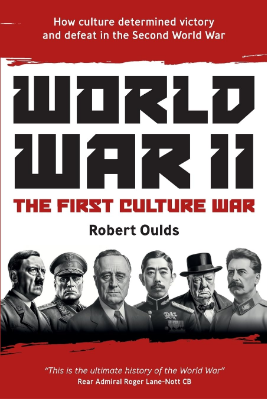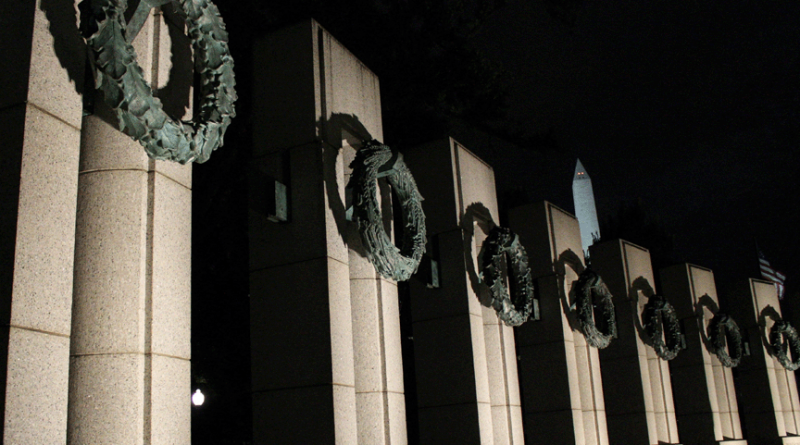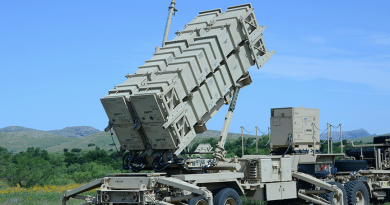World War II: the unlearned lessons
Robert Oulds is the Director of The Bruges Group and is the author of World War II: The First Culture War
The unthinkable has happened, a conventional war on the continent of Europe, but the military has been slow to adapt. Yes, Europe has seen bloodshed since 1945; terrorism, militias fighting in Balkanised countries, unmatched airpower imposing diplomacy on those breaching the peace. However, our security cannot be taken for granted. The invasion of Ukraine has exposed our shortcomings that the Government must quickly address. This can be done by reassessing World War II and our part in it.
Many thought the future of warfare was meeting the challenge posed by small wars tackling irregular insurgents overseas in faraway lands, fighting underdeveloped peoples, who can be eliminated by airpower and mopped up by nimble mobile units, lightly armed, and agile, crossing terrain in armoured vehicles that can shield their crew from small arms fire, but little else.
NATO accordingly developed training and tactics that is, when willing allows, capable of defeating guerilla forces. It is this training that that has been imparted to Ukrainian troops since 2014. In the initial stage of the Russian invasion, these skills worked well against Russian battlegroups, a failed experiment in independent mobile combined arms units.
The Ukrainians could strip away the supporting infantry leaving the armour and artillery vulnerable to encirclement. The battlegroups were divided and operated without sufficient air and mutually supporting artillery cover. That period is firmly in the past. However, the APU, the Armed Forces of Ukraine, have been trained to fight the last war.
The conflict in eastern Europe has entered a new stage that has a semblance to the Second World War and even the Great War before that. The training and tactics taught by NATO are of little use in such a struggle of artillery, airpower, and entrenched men. Western-trained Ukrainian soldiers have performed poorly against the Russian military and their heavily mined defences.
Conversely, those that have served in the fight in Donbas since 2014 have been more able. In some instances, NATO devised tactics have had to be abandoned, as were American Bradley armoured personnel carriers.
Complacency and inefficiency have all had their part to play, but, as told in the book World War II: The First Culture War, an American-centric view of the world and a misunderstanding of its role in defeating Nazi Germany have also played a part in leading military planners down dead ends. A romanticised Hollywood version of history was allowed to prevail that depicts swift-moving mobile American units charging forward, finding weak spots, and exploiting any success.
The starting point of where the breakthrough would be achieved, and the attack’s final destination, were unknown. In the Second World War, such tactics were replicated across American lines. The American Supreme Commander, General Dwight Eisenhower, delayed victory with his broad front strategy, but the Allies triumphed all the same, and commanders such as General George S Patton have since been fetishised. The problems, however, were forgotten, as was Britain’s vital role.
American triumphs were achieved because the British Army fixed the enemy and wore them down in gritty attritional fighting. Men like Field Marshal Montgomery developed precise plans which focussed his forces’ strength, utilised combined arms, and employed artillery and airpower to annihilate resistance.
The balance of global power is shifting. Our security cannot be taken for granted. We need to improve the business of war and bring back the notion of professionalism. In the next war, we may not be so lucky
American leaders aiming to assume the leadership of the postwar world attempted to take all the glory for the downfall of Hitler; consequently, they wrote out, or even denigrated, the role of Britain and its generals.
The problem is that the vital part of the equation played by Britain has been ignored until now. The American military, by far the biggest component of NATO, has passed on its approach to all signatories. From there, a cavalier attitude to war, and a romanticised attachment to attacking to excess, without adequate numbers, has been adopted by Ukraine who are fighting on too many fronts.
This is not the first-time training of foreign allies has failed to provide those under our tutelage with the necessary skills. The recent expedition to Afghanistan’s Helmand province involved training the now-defunct Afghan National Army. No benchmarks were given, and instructing the local forces was not done in the professional manner that the British armed forces were once associated. That war, through an unwillingness to commit all the resources needed, has been lost, the war in Ukraine is still underway.
Since the start of the Spring counteroffensive, Ukrainian servicemen have been encouraged to probe for weaknesses and attempt to affect a breakthrough. This has not happened, even though American military aid to Ukraine is greater than Russia’s entire defence budget.
Ukrainian forces are yet to barely reach, let alone breach, Russian defence lines. Recriminations are already underway. Elements of the German press have been openly critical of Ukrainian commanders. One hopes the Germans do not think they can do better.
Certainly, they are concerned, their Leopard tanks, once thought to be the world’s premier panzer, has performed poorly with many knocked-out by Russian missiles. Germany has received little for their support, they are facing deindustrialisation itself partly driven by high-energy costs caused by the need to pivot from Russian gas to that sourced from America.
The failure to fight the right war has been matched by the inability to prepare for conventional warfare. Supplies to Ukraine have depleted stores of ammunition to such an extent that the security of Western nations has been compromised, and still, Ukraine cannot match Russian artillery fire. This is not the only shortcoming. US-supplied drones have not been as effective as hoped, and we were thinking that Amazon would soon be delivering our parcels by air.
The fighting has been centred on the European Union’s eastern frontier, which remains an economic backwater. Russia’s economy is smaller than that of Italy, yet Russia has more nuclear weapons than the United States. The Russians and the Chinese have hypersonic missiles to which we may have no defence.
These devices threaten, and perhaps make redundant, even the aircraft carrier, which may now be considered too big to fail. Any unwillingness to use these ships in combat would make these leviathans obsolete. These shortcomings should not have been allowed to happen, especially as NATO defence spending dwarfs its rivals.
The taxpayer should be outraged. The waste at the heart of the Ministry of Defence is astounding. Like many civil service departments, rent-seeking corporations’ profit by being awarded government contracts to do little badly. This disease is even affecting those that we rely on for our security. The MoD spends with little accountability. Never in the field of human government was so much taken from so many and given to so few. Its procurements overrun both their time and budgets.
The taxpayer pays and private interests benefits. Britain’s military spending is comparable to that of Russia, yet our armed forces are continually being cut in size. There is a deep reluctance in the state to incur the expense of large armies. It’s warfighting on a budget, what funds are available to go towards those who have won, not battles, but government contracts.
The Ministry of Defence has become just like every other inefficient public service. Despite record spending, or perhaps because of it, there are more bureaucrats than belligerents. The same disease which affects the NHS, leading to excessive waiting lists, also infects policing, which has at least become efficient at giving out crime numbers.
Like Britain’s other creaking public services, the MoD should undoubtedly receive more, yet calls for more spending on the military should be accompanied by demands to know where the money will be spent and how. And just as importantly, checks will have to be made to ensure value for money?
Like at any get woke go broke corporate institution, resources are wasted on concern about carbon emissions. This and the many diversity initiatives are dangerous distractions. The recent woke Wigston Report seeks to transform the armed forces socially and introduces the notion of ‘extreme’ behaviours. Willingness to fight for King and Country and express one’s patriotism is now to invite suspicion.
Ironically, the author, Air Chief Marshal Sir Michael Wigston, is a prominent proponent of the Russian threat. Yet, his diversity initiatives threaten the marshal capabilities for which Britain was once famed. The military-industrial complex has been replaced by the military-woke alliance.
Divisive identity politics lost the Nazis the Second World War; their extreme prejudices misallocated resources and undermined meritocracy; in a naïve way, our military has regretfully mirrored this by embracing the latest strand of identity politics. Priority is being given to pilots on the grounds of race, not ability or aptitude. Standards are being made less severe to facilitate women joining the ranks and not dissuade a less healthy population from signing up.
Long gone are the ways of Field Marshal Montgomery, the Spartan General, who wrote the British Infantry Training Manual and who was second to none in imparting warfighting skills to his subordinates and taught Britain’s Tommie’s to fight World War II.
Britain and its efficient industries in the Second World War produced more planes than the massive USSR. We won because industry had been honed by the requirements of a competitive market. The same cannot be said today. The balance of global power is shifting. Our security cannot be taken for granted. We need to improve the business of war and bring back the notion of professionalism. In the next war, we may not be so lucky.





